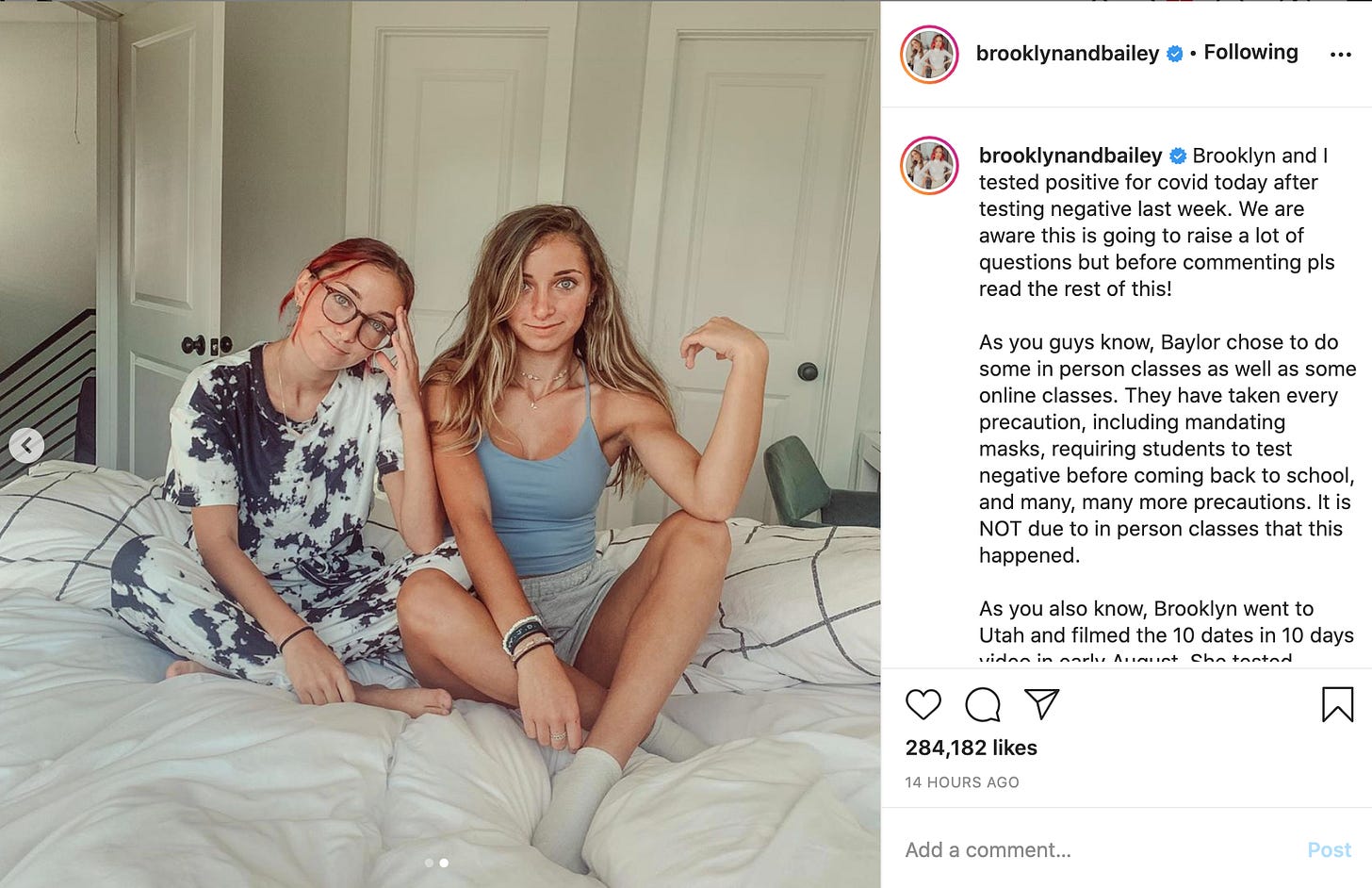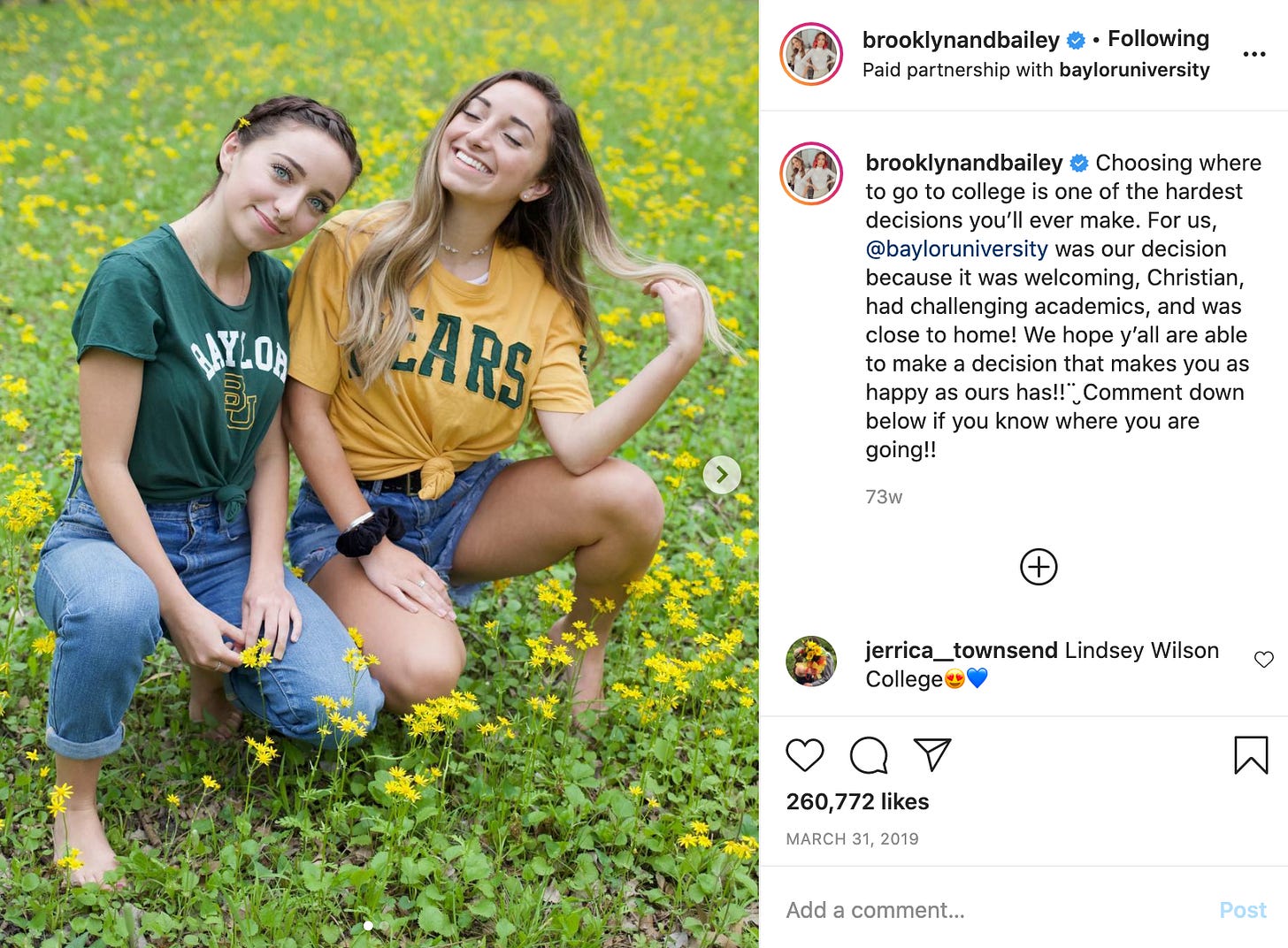
This is the free, Sunday edition of Culture Study — the newsletter from Anne Helen Petersen, which you can read about here. If you like it and want more like it in your inbox, consider subscribing.
In the spring of 2019, I started following Brooklyn and Bailey. They’re second-generation influencers: their mom, Mindy, started the YouTube channel “Cute Girls Hairstyles” when the twins were young girls, and the twins started their own YouTube channel when they were 13. (Today, the channel has 6.9 million subscribers; their Instagram account has 5.8 million followers). In 2017, the two announced that they’d be attending Baylor University — in a video that’s been viewed more than three million times. And as of Friday, they both have COVID.
I started following them when I was writing about Waco, Texas — a town that lives in the minds of most people over a certain age as the site of the Branch Davidian standoff [the Waco resident refrain: it wasn’t even in the city limits!] and, for people who’ve watched any amount of HGTV, as the home of Chip and Joanna Gaines and the site of dozens of Fixer Upper homes. The town is a whole lot more than that, though — and I spent several thousand words trying to figure out more of what was going on at the intersection of gentrification, the Gaines’ church, Antioch, and Baylor’s own goal to become the “Notre Dame of the South.”
Brooklyn and Bailey’s Instagram was a part of the first, ten-thousand word draft of that piece. They eventually got cut, but I kept following them, and have grown used to their big, heavily mascara’ed blue eyes and tastefully filtered photos in my feed. Baylor is a Baptist school that, for years, was happy to be the school of well-to-do Texas Baptists. It has been historically slow, and often proudly so, to catch up with the status quo: it didn’t admit its first black student until 1964; it unofficially banned dancing until 1996; the university is still figuring out what to do about its LGBTQ Group after it removed language from its conduct code that described “homosexual acts” as “misuses of God’s gift.”
But over the last twenty years, Baylor essentially decided it wanted to become cool. A big school, a football and basketball powerhouse, a place people dreamt about instead of denigrated. Part of the project of making it cool was building a shit ton of new buildings, and a corner of the riverside that feels like a country club. Part of it was making the school look alluring from I-35: I’ll never forget the turrets and faux Ivy League design of a parking garage, designed that way because the structure was visible from the interstate that barges through town, carrying millions of cars between Austin and Dallas.
And part of it was students like Brooklyn and Bailey. They’re Mormon, and their morals and beliefs blend fairly well with the religious aesthetics/expectations of Baylor. They’re cheery, and chaste — apart from some tank tops and bikinis, which, well, I personally think are fine, but the head counselors at my church camp would chide for “tempting our Christian brothers” — and mostly post about their new clothing line, being goofy, and, at least for one of them, chastely hanging out with her boyfriend.
In April 2019, just after I was in Waco, Paige Skinner wrote a jaw-dropper of a piece for the Dallas Observer about the twins, who’d agreed to an interview to help promote their mom’s new book. (Key quote re: social media in the house: “No social media until age 13. Parents will monitor all texts and social media activity. A multi-page contract will be signed before you’re given a phone, computer or car. No downloading apps without parents' permission. Phone must be charged at all times. Phones are placed in the kitchen every night at 10.”) The twins told Skinner about the fan club that had started at Baylor, where students watch their videos, and about the contracts they had roommates sign before moving in.
But they didn’t tell her about the paid partnership they had with Baylor — and neither did a Baylor spokesperson. While Skinner was writing the piece (and, I remember, while I was writing mine) the first of several “paid partnership” posts between Baylor, Brooklyn, and Bailey (I KNOW) went live:

Now, if you were Baylor, and you were trying to figure out how to encourage kids to think of your school as as school to apply to, a school that is cool, then this partnership makes COMPLETE AND TOTAL SENSE. Or it at least makes about the same amount of sense as cultivating your sports program (which Baylor has also done) so that it can be nationally recognized and make people think of your school as elite (see: Georgetown, Duke, Notre Dame). In truth, sports has nothing more or less to do with academics than lifestyle influencing; it’s just that sports has been normalized as an extension of higher ed.
With that said, it’s ridiculous to the point of sad hilarity that athletes can’t get compensated for their brand promotion (or for the literal millions of dollars they bring into the school), but influencers like Brooklyn and Bailey can. The difference, of course, is that universities have kept up the farce that their student athletes are just, I dunno, playing for the fun of it, not actually acting as brand ambassadors. But straight up influencers like Brooklyn and Bailey make any such pretense impossible. And as Derek Jenkins put it on Twitter, “How many racialized students have been pressured onto the cover of their university’s student catalog without the added incentive of a “brand partnership”?
To be clear, I’m not saying that either of these strategies is good or ethical! But they are absolutely, positively in line with the economic positioning of the modern higher ed, which doesn’t market itself as a place of learning so much as a site of lifestyle.
So what happens when these influencers, who have a past brand relationship with their university, contract COVID while at their university for “hybrid” classes? You get sentences like the one in the Instagram post: “[Baylor has] taken every precaution, including mandating masks, requiring students to test negative before coming back to school, and many, many more precautions. It is NOT due to in person classes that this happened.”
Are Brooklyn and Bailey compelled, by administration, to publish this? I’m guessing not. But if they want to continue their brand partnership…..what else would you post? The financial relationship between the two compels them to behave as high profile boosters for the college’s COVID plan, even though these cases would not be proliferating if the university hadn’t brought students back to campus.
And then there’s the WHOLE OTHER ELEMENT of essentially live streaming your disease. How do you stay on brand and on message during COVID? (Right now, the extent of their COVID stories = a picture of some Magnolia (aka Chip and Joanna Gaines) treats, so they’re crafting some Waco brand synergy). How do you continue to cultivate the idea that you have been “unbelievably careful” when there are videos on your YouTube channel of ten dates with ten guys all without masks? How did those videos help normalize, well, normal, un-careful behavior?
As Tressie McMillan Cottom pointed out, all of this is a vivid manifestation of disaster capitalism: a term popularized by Naomi Klein to describe how societies, during times of catastrophe, acclimate to capitalist practices that would otherwise be unacceptable. See: starting in-person classes at universities across the country, despite clear evidence that bringing in tens of thousands of college students will result in massive spread both on and off campus, because so many higher ed business models now depend on it.
The testimonies I collected last week made one thing clear: institutions attempting in-person instruction know they’re going to shut down. They’re just desperately trying to make it past the day when they can refuse requests for a semester refund. Those testimonies — and spiking case numbers, from Illinois State University to University of Alabama — speak truth to the lie that in-person instruction of thousands of undergrads is possible without significant community spread.
Brooklyn and Bailey’s COVID diagnosis does the same, but it also highlights something slightly different. “Brand partnerships,” after all, can’t exist without two brands. And that’s what American higher ed has become: a slew of brands, eager to partner with other brands (aka the contemporary student) who will heighten the visibility and desirability of their institution and the lifestyle they could have there. Community colleges have no compunction about going to online instruction. They know exactly what service they provide: an education, full stop. But public and private colleges and universities, who’ve yoked themselves to the idea of college as a lifestyle experience, have no other choice, even when that lifestyle is a COVID accelerant.
Come back, they say, and live the college life you’ve dreamed of — just wear a mask! It’ll be fine! And if you get sick, Brooklyn and Bailey have already shown you what to do next.
Things I Read and Loved This Week:
Without congregations, evangelicals are flocking to QAnon.
Alexander Chee on the scars of the Japanese occupation of Korea
How social justice slide shows took over Instagram
This perfect little blog post on Top Gun
On what *actually* killed New York
Loved loved loved this deep dive into the fact checking (and why so many publishers don’t pay for it — and why that’s a problem)
To Manage Wildfire, California Looks to What Tribes Have Known All Along
This week’s just trust me
As always, if you know someone who’d enjoy this sort of mishmash in their inbox, please forward it their way. If you’re able, think about going to the paid version of the newsletter — one of the perks is a weirdly fun/interesting/generative discussion thread, just for subscribers, every week, which is thus far still one of the good places on the internet. If you are a contingent worker or un- or under-employed, just email and I’ll give you a free subscription, no questions asked. If you’d like to underwrite one of those subscriptions, you can donate one here.
You can find a shareable version online here. You can follow me on Twitter here, and Instagram here. Feel free to comment below — and you can always reach me at annehelenpetersen@gmail.com.





brilliant